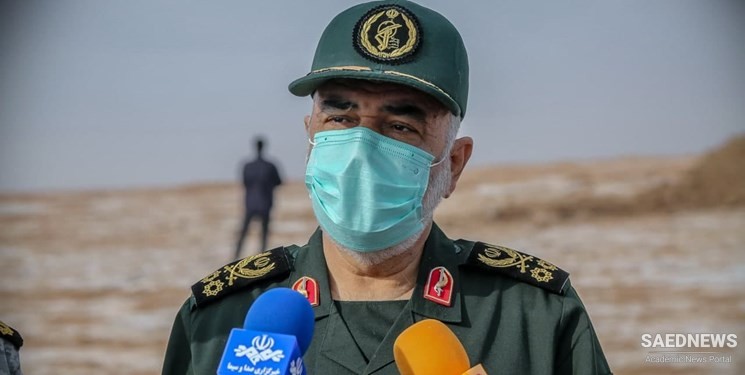Tehran, SAEDNEWS: “Given the absolute distrust, we cannot trust enemies to allow them to inject a vaccine solution into the body of our people, because we know that in the strategy of the enemy, paralyzing the Iranian people is a decided objective. Using biological weapons is an indispensable part of the enemy's military strategy. Can the enemy be allowed to inject to our people a vaccine solution that we do not know what it is,” General Salami said, addressing a ceremony in the Southeastern city of Kerman on Sunday.
He underlined that Iran will import foreign-made coronavirus vaccines whose healthy nature is clear to the country or it will use home-made vaccines.
General Salami referred to Iran’s special conditions while fighting in both fronts of coronavirus epidemic and the US sanctions, and said his country cannot use its money which is blocked in the banks of other countries by the US to purchase medicine, vaccines and medical items.
Iran has seen a major surge in the number of coronavirus deaths and infections in recent days as the Delta variant of the virus continues to spread across the country.
Tehran has been importing vaccines from friendly countries, including Russia, China, India and a number of others, and has developed vaccines jointly by Cuba and Australia in addition to several home grown projects, but underlined that it would not import vaccines from the US and the UK.
Iranian President Seyed Ebrahim Rayeesi said last week that the country will import 30mln doses of COVID-19 vaccine, stressing the necessity for providing millions more jabs to give immunity to the society.
Iran will import 30mln doses of vaccine, Rayeesi said, addressing a meeting of the national coronavirus campaign headquarters in Tehran.
“Experts believe that 60mln more doses of vaccine should be provided to control the improper situation of coronavirus outbreak in the country,” he added.
Rayeesi underlined for more serious measures to respect the health and hygiene protocols and control the border traffic to prevent further spread of coronavirus.
He set an ultimatum for the government to drastically change its methods of fighting the coronavirus epidemic as the country’s health system struggles under a fifth wave of infections.
Rayeesi told members of the national coronavirus campaign headquarters that Iran has to come up with an extensive plan for mobilizing volunteer forces to fight the rapid spread of the disease.
“The universal plan for overhaul in methods of fighting the coronavirus will be compiled in a special committee using the experiences of the past one and half years of the country,” said the president.
He said the plan would include clear action guidelines on hygiene protocols, vaccine production and delivery as well as on government support for health staff and businesses affected by the virus.
On vaccinations, Rayeesi vowed that his administration will continue to support domestic vaccine production although he said that no efforts will be spared to receive abundant supplies from abroad.
The coronavirus COVID-19 is affecting approximately all countries and territories around the world. The virus was first reported in the central Chinese city of Wuhan late 2019. It has so far killed over 4.4 million people and infected over 212 million others globally.
The Iranian foreign ministry declared that despite Washington’s claims of cooperation to transfer drugs to Iran via the new Swiss-launched payment mechanism, the US is troubling the process amid the coronavirus outbreak in the country.
Although US claims that medicines and medical equipment are not under sanctions, they have practically blocked the transfer of Iran’s financial resources in other countries into the Swiss Humanitarian Trade Arrangement (SHTA), former Iranian Foreign Ministry Spokesman Seyed Abbas Mousavi said.
As the death toll from the virus surges, Iran intensifies its preventive safety measures. Closures of schools and most universities have been extended until further notice.
In relevant remarks last week, Iranian First Vice-President Mohammad Mokhber rapped Washington and its allies for imposing banking sanctions which prevent Iran’s efforts to buy drugs and medical equipment amid surge in the number of coronavirus infected and deaths in the country.
“Although the arrogant system (led by the US) claims that access to medicine is free for all people and there is no restriction for any country, when we want to purchase the needed medicine, they do not allow transfer of money and prevent the drugs’ imports,” Mokhber said, addressing a meeting in Tehran.
He also noted that coronavirus has affected many businesses and the shortage of medicine and treatment-related issues have also placed a heavy burden on the country's budget, saying that these problems need serious planning and efforts to address the problems of businesses which are affected by the COVID-19 epidemic (Source: FARS NEWS).


 IRGC Commander Vows Devastating Response to Enemies' Possible Threats
IRGC Commander Vows Devastating Response to Enemies' Possible Threats














































